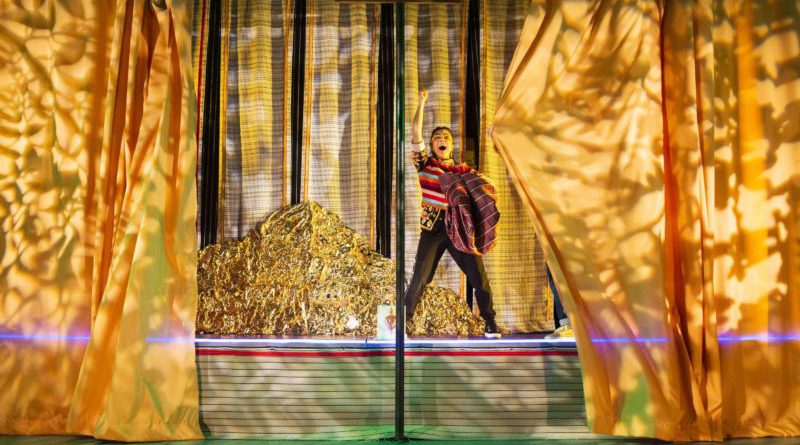INTERVIEW: New section of ‘One Thousand and One Nights’ explored in ‘Marjana’ play
Photo: Marjana and the Forty Thieves, starring Caitlin Nasema Cassidy, reinterprets a classic tale from One Thousand and One Nights. Photo courtesy of Gaia Squarci / Provided by Everyman Agency with permission.
One Thousand and One Nights is a collection of stories that has impacted the literary and cultural world throughout history. Target Margin Theater in New York City has dedicated itself to exploring different sections of the seminal Islamic work, and this year they are turning a fine focus on Marjana and the Forty Thieves.
Most readers know about Aladdin, Sinbad and their many voyages and adventures. This theatrical interpretation looks again at the story of Ali Baba, but the focus turns to Marjana, a slave woman who gains her freedom within the tale. The director, David Herskovits, focuses the production on issues of equality, agency and power.
Recently Hollywood Soapbox exchanged emails with Herskovits about Marjana, which continues through April 28 at The Doxsee in Brooklyn. Questions and answers have been slightly edited for style.
What inspired this production of Marjana and the Forty Thieves?
In a nutshell: exciting storytelling and all the ways it can happen. I love work that is both fun and challenging, serious art and sheer entertainment, both at once. That is The Thousand and One Nights.
We know these stories — sort of. We know Aladdin, we know Scheherazade, we know Sinbad, and we know Ali Baba, or I should say we feel like we do because we know so many popular versions of these stories and their characters. But when I really began to read the source stories of The Nights I quickly found that they are much more challenging and dream-like than I realized. This is exactly what makes me tick artistically.
In the case of Ali Baba, it turns out the story is really centered on Marjana, the slave who figures everything out, solves every problem, and saves Ali’s life again and again. In fact, the first recorded version we have was called Marjana’s Perspicacity — she was the hero! Putting her back at the center felt clearly right.
How closely does the production stick to the source material, and how is the piece created?
We stick to the sources by coming at them sideways. In my work, everything is true to the original, and everything is shifted so it comes into focus for us today. I think things are truer when they diverge from a strict by-the-numbers translation. As Cocteau said, ‘I am the lie that tells the truth.’
Our process for Marjana was unique. The whole company created this play. Over the past three years we held meetings, readings, discussions and workshops to explore the collection of stories known as The One Thousand and One Nights. We generated language, stagings, styles, design ideas. We explored various translations, secondary material, personal responses. All of that work resulted in the event itself and the text that is its trace.
We try to work in a way that is radically inclusive. Overlapping groups of performers, designers, production people, designers, managers, interns, technicians — many, many people with a stake in our company’s work shared in this process. You will hear words and see imagery suggested by all of them. It is true that I have been responsible for prompting the process and selecting and shaping from the vast field of work we created; the play reflects my own artistry and values, and I own that. But every moment of this event involves the voices and hands of many people. It could not have come to be without them all.
Are you hoping this classic tale is seen through a modern lens and how it might speak to society in 2019?
Well, the obvious issue is gender and power. Here we have a woman with no power, a slave in fact, yet she has the greatest agency of anyone; Marjana turns out to be the toughest person in the whole story. At the same time there is another woman at the center of the story: Scheherazade.
All of these tales are really being told to us by a woman, another powerless woman at the mercy of a bloodthirsty man; she has to keep the stories going to save her own life every night. But the material is freighted by sexism, full of speeches and poems and references to how faithless women are, how treacherous. The result throws these issues into the foreground in a very harsh light. We cannot hear these stories without confronting questions of sex and power.
How have rehearsals gone with the ensemble?
Fun! I only want to do it if it is joyous. We work very hard (after all we are making up a play from scratch), and we savor every moment.
Why is it important to have companies like Target Margin Theater?
Target Margin wants to be the place you go for a new adventure. We make work that is unlike what you may have seen before, and we embrace the risks of that. This means we can really stretch our work, try to make theater in new ways, and dive into deep waters.
For example, this play is about storytelling, and we have created three completely different approaches to storytelling in this short evening. Each one is a kind of experiment in how theatrical we can make a tale and still tell it. Like I said, challenging and fun.
By John Soltes / Publisher / John@HollywoodSoapbox.com
Marjana and the Forty Thieves, a production of Target Main Theater, plays through April 28 at The Doxsee in Brooklyn. Click here for more information and tickets.

